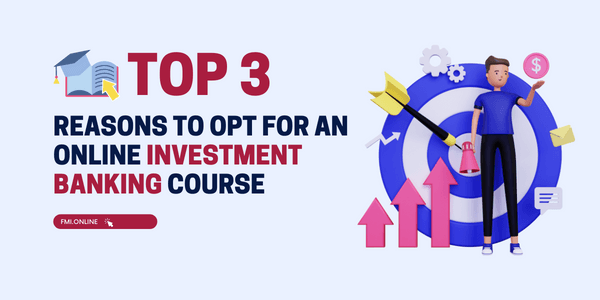With expanding financial markets, demand for investment bankers has also grown to a large extent. The size of the global investment banking industry is estimated to be over $155 billion and is expected to reach over $230 billion by 2026, growing at a CAGR of 10.4%. Hyper globalisation and recent supply chain issues have also made businesses explore synergies with their global counterparts and opt for mergers and acquisitions to achieve efficiency and reduce competition.
One of the core focus areas of investment banks has been mergers and acquisitions, which is why the current scenario puts investment banking in a sweet spot for the coming years. Working in this industry requires a deep understanding of the economy, finance, and the various investment banking divisions. So naturally, upskilling and specialisation is essential for working as an investment banker. Thanks to the internet, some of these skills can be acquired through online courses. But what exactly makes them worth the buck? Let’s find out from those who have experienced these courses in real time.
1. Helps you stand out from the crowd
Breaking into investment banking as a graduate is hard. Banks such as Goldman Sachs and JP Morgan attract over 250,000 student applications every year, out of which only 2% of the applicants are selected.
Introductory courses, such as the investment banking pathway course can help you bridge the gap between theory and practical skills and distinguish you from the crowd. A course student says, “FMI courses are all you will do to get better insights into the field of finance. These courses are very well structured. You will learn all the necessary things you need to know.”
Others benefits include the possibility of a hike in your pay scale. These courses highlight one’s passion and initiative towards the field and can place you higher than your peers. Moreover, pursuing an online course allows you to interact with a diverse group of individuals with different backgrounds and helps you expand your professional network.
2. Makes learning engaging
Depending on your academic workload, career goals, or personal preferences, you can complete your certification as quickly, or as slowly, as you choose to. While some online courses require students to attend live lectures, one can otherwise fit the course into their already busy calendars and proceed at their speed.
An experienced IB professional shared his views on online learning, “ I started my learning journey with FMI as suggested by my friend. I wanted to refresh my knowledge as I am working in IB domain. This was a great treasure, helped me sharpen my knowledge, and I don’t have to prepare separately on my domain during interviews. I have suggested this to more freshers who wanted to change their domain to IB or the world of finance. This even helped experienced people refresh their knowledge. There are multiple modules to kickstart your learning journey.”
3. Helps advance your skills
With the increasing use of technology, across industries, business models are evolving. Algorithms, data, and forecasting are more valuable than ever before. The evolution of industry composition in stock market indices, across the globe, is a prime example of this shift. Simultaneously, with expanding financial markets the industry is getting more competitive and the need for upskilling and refreshing core concepts is vital. Online courses turn out to be the right fit for working professionals and offer significant value to them. According to a master’s student, “for those working in the IB industry, FMI offers a fantastic platform and a clear explanation of all the finance jargon.”
Conclusion
With the rising demand for investment banking, brutal competition and dynamic business environment, the need for specialisation and upskilling is ever-expanding. Since online courses can provide you with an opportunity to gain an edge over your peers and advance in specific areas such as asset management or global markets, they are worth the investment. Moreover, with affordable pricing, convenience, and interactive industry content, the learner does not have to make any significant trade-offs to pursue these courses.












 60+ hours
60+ hours 9 courses
9 courses



